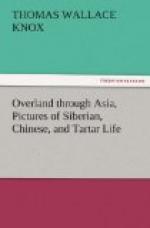“By what right do you ask for it? Are you police?”
“No; but we are inhabitants of the village.”
“And can you enter houses, and ask for passports! Who can say whether you do not mean to rob me of my papers? But my answer is ready. I am Lavrenti Kouzmine, going to Bohotole; and it is not the first time I have passed through the country.”
He then entered into details of the road and the fair at Irbit, ending by showing his permission to pass, which, as it bore a stamp, satisfied these ignorant men.
“Forgive us,” said they. “We thought you were an escaped convict; some of them pass this way.”
Henceforward, he dared not seek the shelter of a house. From the middle of February to the beginning of April, in the midst of one of the severest winters ever known, his couch was in the snow. Frozen bread was his food for days together, and the absence of warm aliments brought him face to face with the terrible spectres of cold and hunger. The Urals were reached, and he began to climb their wooded heights. On passing through a little village at nightfall, a voice cried: “Who is there?”
“A traveler.”
“Well, would you like to come and sleep here?”
“May God recompense you, yes; if it will not inconvenience you.”
An aged couple lived there—good people, who prepared a meagre repast, which seemed a feast to Piotrowski: the greatest comfort of all being that he could take off his clothes.
[Illustration: SIBERIAN EXILES.]
They gave him his breakfast, and would not accept any remuneration but his warm and cordial thanks.
One evening Piotrowski’s life was nearly extinct. The way was lost, the hail pierced his skin, his supply of bread was exhausted, and after vainly dragging his weary limbs, he fell into a kind of torpor. A loud voice roused him—“What are you doing here?”
“I am making a pilgrimage to the monastery of Solovetsk, but the storm prevented my seeing the track, and I have not eaten for several days.”
“It is not surprising. We who live on the spot often wander away. There, drink that.”
The speaker gave him a bottle containing some brandy, which burned him so fearfully, that in his pain he danced about.




